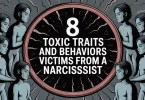Today, we’re discussing the peculiar behaviors exhibited by toxic families when you decide to go with no contact.
What defines toxic families? Toxic families consist of toxic family members. A toxic individual fearlessly offers their skewed opinions of you, even if they’re faulty. In contrast, healthy families possess boundaries; children and family members feel secure. In a healthy family, you can openly express your feelings to the family matriarch without fearing criticism or demonization. You sense acceptance and participation in a system that nurtures your personal growth. Even if differing opinions exist, your voice matters.
Unveiling the Dynamics of Toxic Families and Their Unspoken Rules
Regrettably, the situation shifts into a toxic family. Toxic members exploit others and indulge in criticism. Addiction issues may plague these families, yet discussions about such problems are off-limits. Gambling, alcoholism, or drug addiction might prevail, but they remain unmentionable. Toxic families operate under a ‘no talk’ rule; thoughts can’t be expressed. Similarly, a ‘no feel’ rule prevails, where emotions remain suppressed and unexpressed. Genuine reactions are forbidden. In such systems, independent thoughts are stifled, even if this fact is unspoken. Going against the family’s wishes incurs consequences, creating an atmosphere of inauthenticity.
In a toxic family, authenticity is rare. Everyone remains vigilant, anticipating the next conflict. Arguments, criticism, and discord dominate conversations. Boundaries evaporate, leaving you devoid of safety. Authenticity becomes a luxury in this scenario.
Just like with toxic individuals, toxic family members fail to acknowledge their personal shortcomings. They typically single out a scapegoat – someone vulnerable and unlikely to resist. Flaws are projected onto this scapegoat. Disconcertingly, their perception of you misaligns with your true self.
Confronting Narcissism and Codependency in Toxic Family Dynamics
Those who come from toxic families encounter such dissonance. A narcissistic parent, sibling, aunt, or uncle falsely accuses you, causing inner turmoil. Striving for validation ensnares you in codependency’s grip. A lack of empathy characterizes toxic family members. They openly disregard boundaries, leaving you unsupported. Worse still, no one defends you; they perpetuate the cycle by supporting the toxic individual. You might feel isolated, questioning your significance to those who should cherish you.
Toxic family members often feign ignorance. Blatant issues are ignored or swept under the rug. The narcissist’s behavior is excused while truth-tellers are shamed. This behavior enables the toxic dynamic to persist. Narcissism thrives in toxic families. Accountability is evaded, and a sense of denial blankets the entire system. Disrupting this status quo threatens the fragile balance.
Breaking Free from Gaslighting and Reclaiming Truth in Toxic Family Bonds
Gaslighting is another tactic. Confrontations about missing items or inappropriate behavior are met with denial. The family sides with the offender, manipulated by the narcissist’s skillful diversion tactics. Your simple truths morph into threats, destabilizing the family’s facade.
Toxic families twist narratives, accusing you of malevolent intentions. Your earnest desire to help morphs into perceived malice. Criticisms label you as unforgiving, stuck in the past, or unappreciative. These tactics obscure the truth, leaving you emotionally battered.
Going no contact breaks the cycle. Toxic families will blame you, but you’re the threat. Your pursuit of healthy relationships is misinterpreted as an attack. The truth is, you’re paving the way for healing, distancing yourself from the toxicity.
Remember, your path forward includes self-love, compassion, and truth. Embrace the pain and healing; your breakthroughs lie on the other side. In time, you’ll attract those who resonate with your positive energy.







Leave a Comment